A spherical ball of mass m and radius r rolls without slipping on a rough concave surface of large radius R. It makes small oscillations about the lowest point. Find the time period.
Let at any instant, the boby is at angular position θ with respect to the vertical line drow from the center of mirror , if ϕ is the angular displacement of the ball about its senter, then
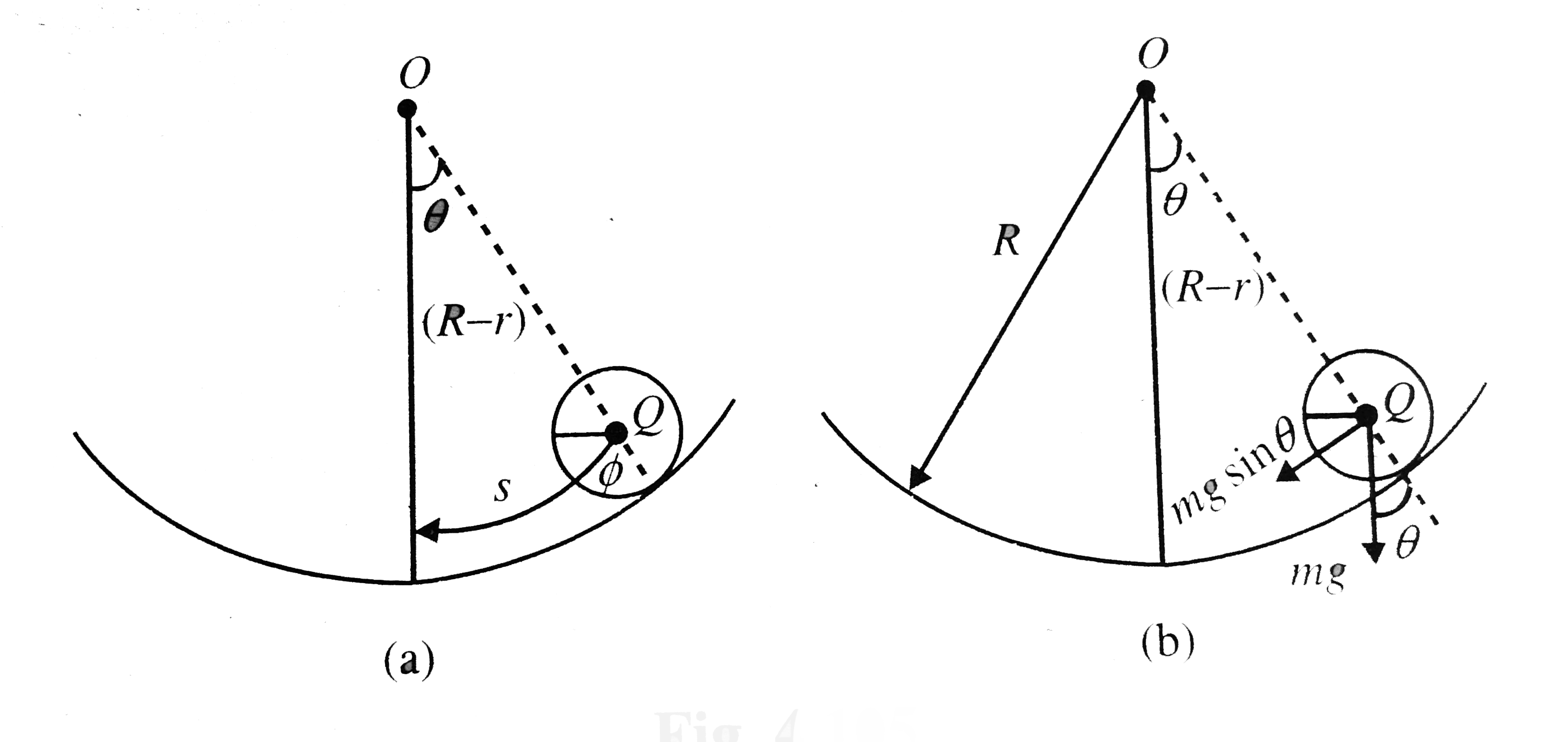
Restoring tarque acting on the ball τ=−mgsinθ×r
For small θ,sinθ ∴τ=−mgsinθ×r
or τ=−mg[rR−r]ϕr=mg(r2R−r)(−ϕ)
Angular acceleration α=mgl(r2)R−r)(−ϕ)
Now comparing above equation with atandard eqation of SHM, α=−ω2ϕ,we≥tω=√mgl(r2R−r)
Here l is moment of inertia of the rolling ball about the point of constant which is l=7/5mr2
⎷mg75mr2(r2R−r)=√57g(R−r)
and T=2πω=2π√7(R−r)5g
Alternate method: We can that when the CM of the boby is shifted slightly by an angle θ relative to the center of curvature of the surface, the magnitude of acceleration of the CM of the boby can be given as
a=gsinθ1+k2r2
(because the body is accelerating down the inclined plane of instancous angle θ)
Subastituting sinθ=θ=xR−r , we have
a=−gx(R−r)(1+k2r2)
(negative sign is given because ¯a and ¯x are oppositely directed)
Comparing the above equation with a=−ω2x, we have
ω=
⎷g(R−r)(1+k2r2)
For solid sphere k2=2/5r2.
Hence ω=√57g(R−r)
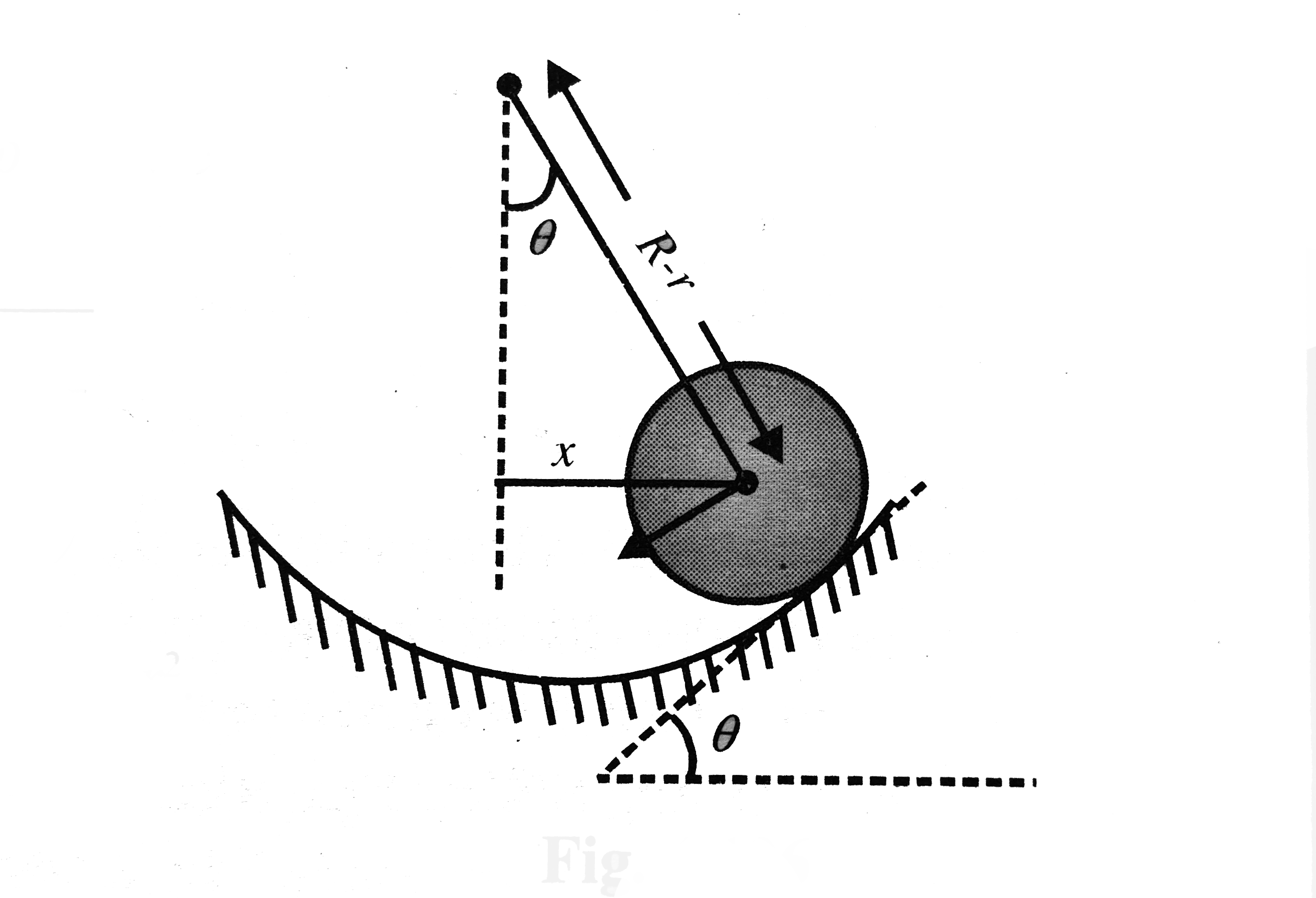
Topper's Solved these Questions
- BOOK - CENGAGE PHYSICSCHAPTER - LINEAR AND ANGULAR SIMPLE HARMONIC MOTIONEXERCISE - Exercise 4.123videos
LINEAR AND ANGULAR SIMPLE HARMONIC MOTION
- BOOK - CENGAGE PHYSICSCHAPTER - LINEAR AND ANGULAR SIMPLE HARMONIC MOTIONEXERCISE - Exercise 4.223videos
LINEAR AND ANGULAR SIMPLE HARMONIC MOTION
- BOOK - CENGAGE PHYSICSCHAPTER - LINEAR AND ANGULAR SIMPLE HARMONIC MOTIONEXERCISE - Multiple Correct Answer Type9videos
LINEAR AND ANGULAR SIMPLE HARMONIC MOTION
- BOOK - CENGAGE PHYSICSCHAPTER - KINETIC THEORY OF GASES AND FIRST LAW OF THERMODYNAMICSEXERCISE - Interger11videos
KINETIC THEORY OF GASES AND FIRST LAW OF THERMODYNAMICS
- BOOK - CENGAGE PHYSICSCHAPTER - MISCELLANEOUS KINEMATICSEXERCISE - Interger type3videos
MISCELLANEOUS KINEMATICS
Similar Questions
A ring of mass m and radius r rolls without slipping on a fixed hemispherical surface of radius R as shown. The time period of small oscillations of ring is 2π√n(R−r)3g then find the value of n.
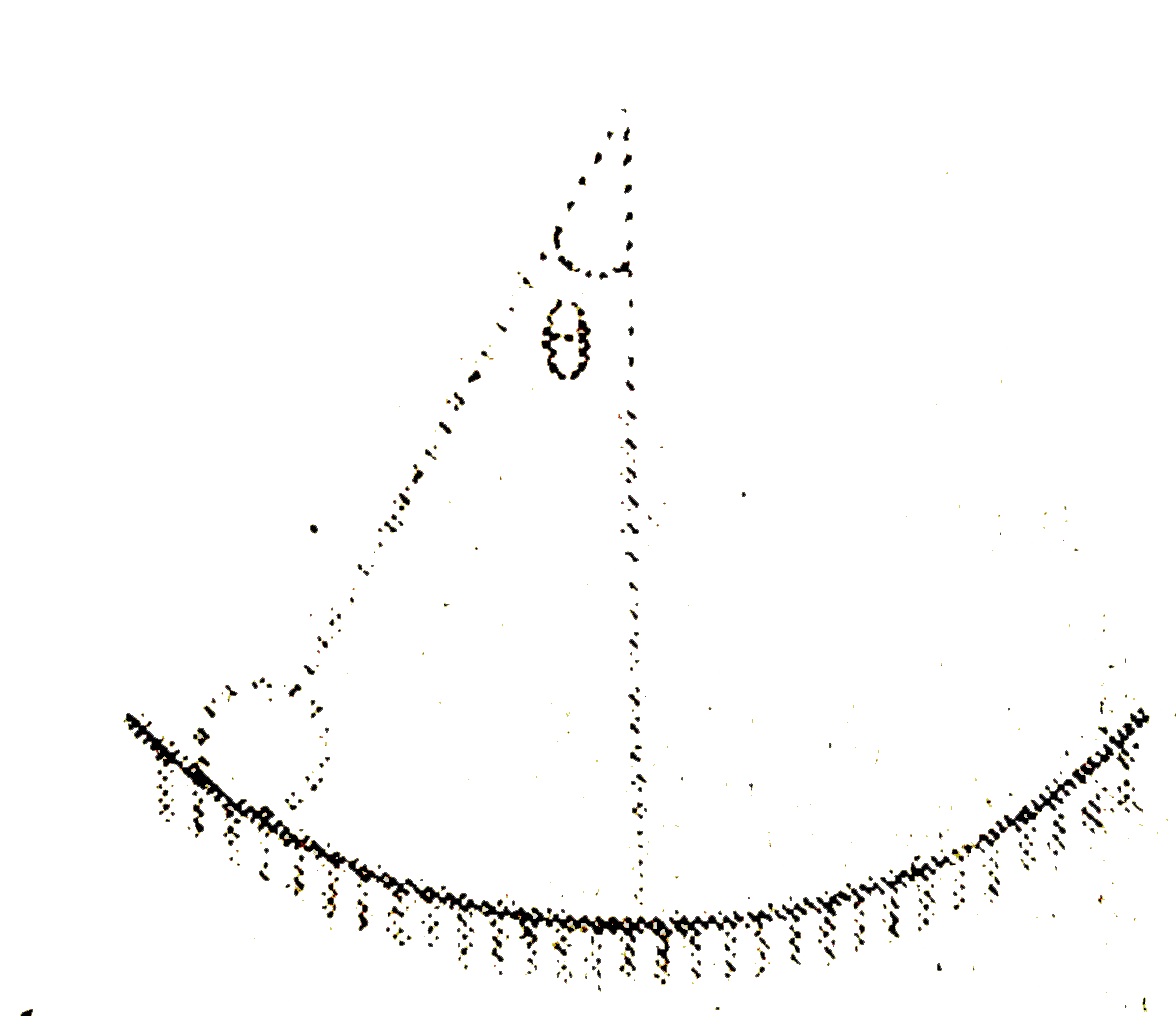 View Solution
View SolutionA small block oscillates back and forth on a smooth concave surface of radius R. Find the time period of small oscillation.
 View Solution
View Solution
Knowledge Check
- Question 1 - Select One
A solid sphere of mass m and radius R rolls without slipping on a horizontal surface such that vc.m.=v0.
AThe kinetic energy of rotation is 15mv20.BThe total kinetic energy is 710mv20.CThe mechanical energy (assume the ground as reference) is mgR+710mv20.DAll options are correct. - Question 2 - Select One
A symmetrical body of mass M and radius R is rolling without slipping on a horizontal surface with linear speed v. Then its angular speed is
Av/RBContinuously increasingCDependent on mass MDIndependent of radius (R) - Question 3 - Select One
A solid cylinder of mass M and radius R rolls without slipping on a flat horizontal surface. Its moment of inertia about the line of contact is ?
AMR22BMR2C32MR2D2MR2
A small spherical marble of mass m and radius r is rolling without slipping on a rough track with speed v.The track further is in the shape of a vertical circle of radius R as shown in figure-5.144. With what minimum linear speed the marble is rolling so that it completely goes round the circle on the circular part of track.
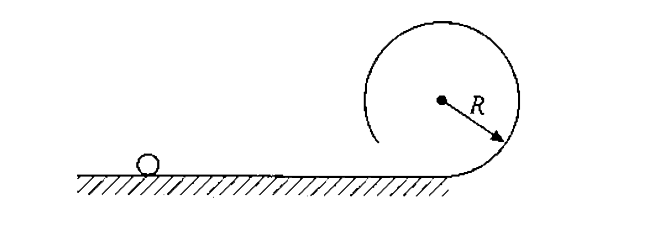 View Solution
View SolutionA solid sphere (radius=R) rolls without slipping in a cylindrical throuh(radius=5R). Findthe time period of small oscillations.
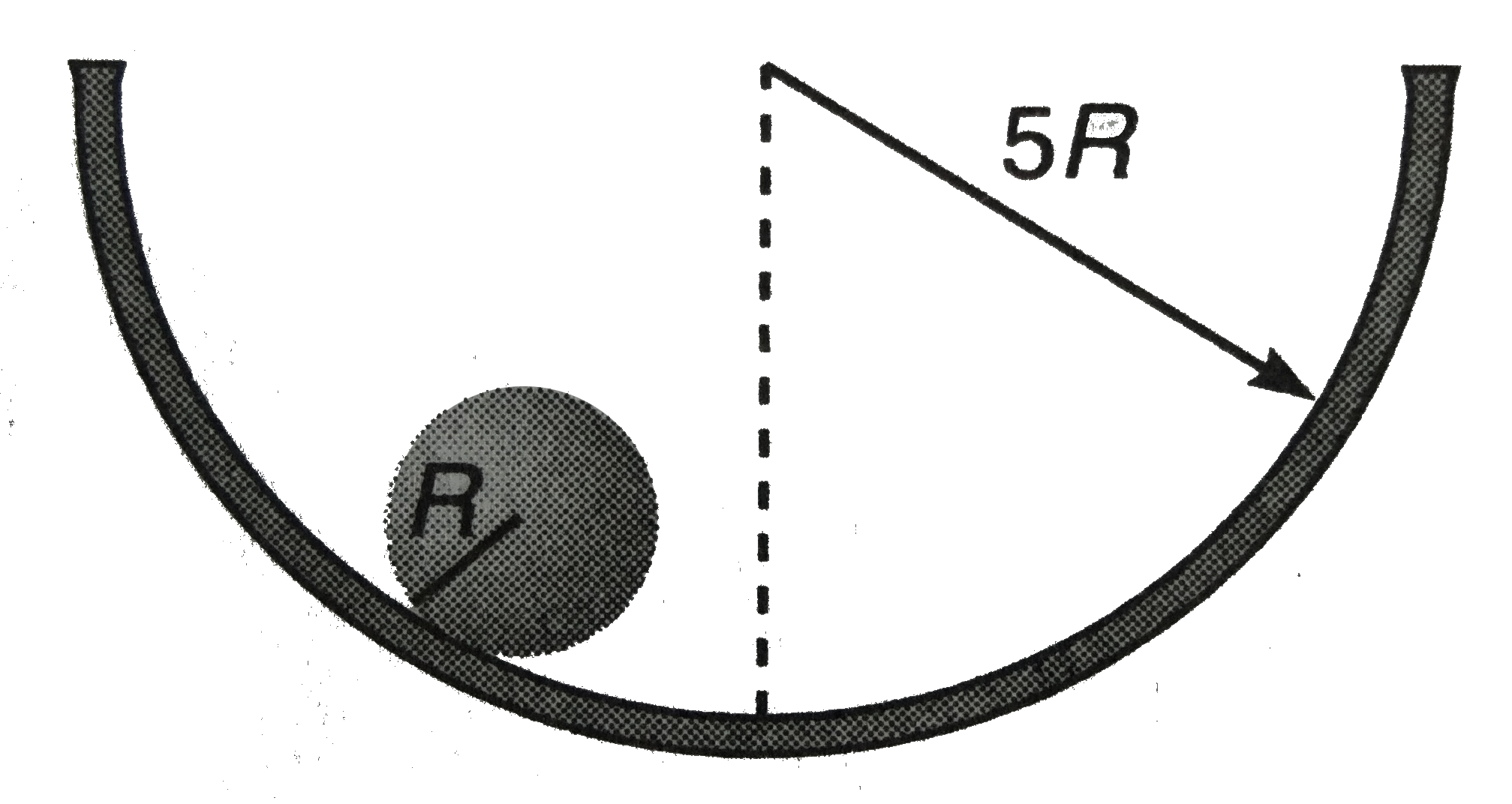 View Solution
View SolutionA small block oscillates back and forth on as smooth concave surface of radius R figure. Find the time period of small oscillation.
 View Solution
View SolutionA spherical ball of radius r and mass m is rolling without slipping on a horizontal table. Calculate the percentage of KE, which is translational.
View SolutionA solid cylinder of mass M and radius R rolls down an inclined plane of height h without slipping. The speed of its centre when it reaches the bottom is.
View Solution

